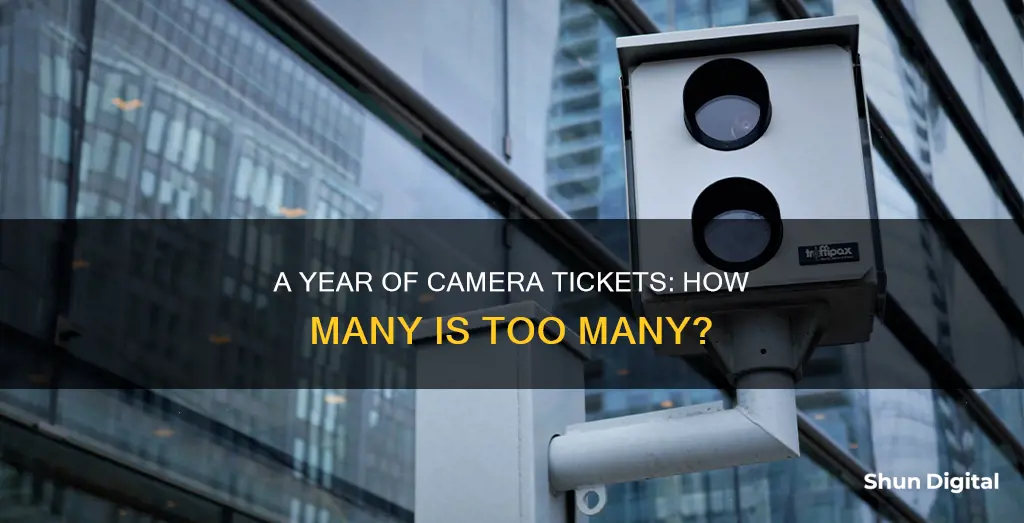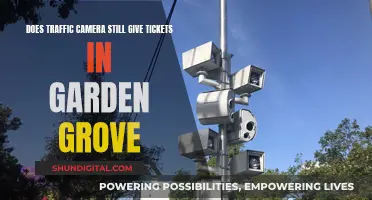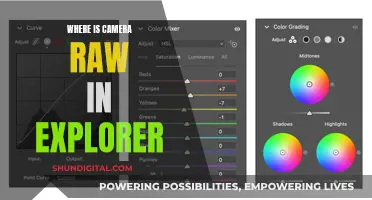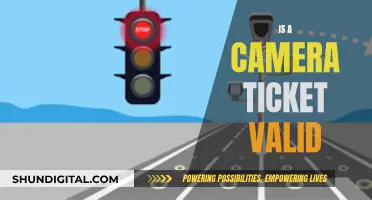
The number of camera tickets issued in a year varies depending on the location and the type of camera enforcement. For example, in 2021, Chicago's 160 speed cameras issued 2.8 million tickets, while LeClaire's speed cameras issued 95,205 citations in the first year of their implementation. In 2023, MTA's bus-mounted automated enforcement cameras in New York issued over 120,000 tickets in just over eight months. Toronto's 50 speed enforcement cameras issued over 80,000 tickets in the first three months of 2024.
What You'll Learn
- Chicago's 160 speed cameras issued 2.8 million tickets in a year
- Toronto's 50 speed cameras issued 80,000 tickets in three months
- LeClaire's speed cameras issued 95,205 tickets in a year
- New York City Transit buses issued 120,455 tickets in eight months
- Red light cameras in California caused almost 130 crashes in 2019

Chicago's 160 speed cameras issued 2.8 million tickets in a year
Chicago's 160 speed cameras issued a staggering 2.8 million tickets in 2021, the equivalent of one ticket every 11 seconds. This figure represents a significant increase from previous years, thanks to a policy change by Mayor Lori Lightfoot, who, in March 2021, ordered the cameras to start issuing tickets to drivers going just 6 mph over the speed limit. Previously, only drivers exceeding the limit by more than 10 mph were fined.
The new rules led to a record-breaking revenue of $89 million for the city in 2021, with the $35 tickets for slower speeders accounting for over two-thirds of the total. This amount is even more astonishing considering that the number of tickets issued was more than the entire population of the city.
The impact of these fines is not evenly distributed across the city. Nearly half of the tickets issued to drivers in low-income neighborhoods were not paid on time, and late fees caused the initial $35 fines to balloon to $85. This regressive tax hits Chicago's poorest neighborhoods the hardest, contributing to vehicle impoundments, driver's license suspensions, and even bankruptcies.
Despite the promise of increased safety, the number of car accident deaths in Chicago increased in 2021 compared to the previous two years. This raises questions about the effectiveness of the cameras in improving road safety and suggests that the program may be more about generating revenue than reducing accidents.
In total, Chicago's speed cameras have generated an astounding $879 million in fines since their implementation, with the top camera, located at 536 E. Morgan Dr., issuing $3.66 million in fines alone. The ongoing use and impact of these cameras highlight the challenges of balancing public safety and revenue generation, with some calling for a reevaluation of the program to ensure it serves the best interests of Chicago's residents.
Understanding Camera Raw's Slow Performance
You may want to see also

Toronto's 50 speed cameras issued 80,000 tickets in three months
Toronto's 50 speed cameras have been busy, to say the least, with a staggering 80,000 tickets issued in just the first three months of 2022. This is a huge jump from the previous three-month period, with a 37% increase in tickets issued.
The Automated Speed Enforcement (ASE) devices, installed across the city, are meant to deter speeding and increase road safety. However, in just two months, April and May, the cameras issued 54,204 tickets, with 3,776 repeat offenders. This is a worrying trend, as speeding is a dangerous and illegal activity that puts everyone on the road at risk.
The ASE cameras are placed strategically near schools and in community safety zones to protect vulnerable road users, especially children. The devices are also installed on arterial roads, which tend to have higher speed limits, making speeding a more severe danger.
The number of tickets issued varies by location, with some cameras catching more speeders than others. For example, in April, the device on Mill Road north of Burnhamthorpe Road issued the most tickets, accounting for 16% of all tickets. The specific locations of the ASE cameras are strategically chosen based on data showing speed and collision challenges near schools and in community safety zones.
While the primary goal of the ASE program is to reduce speeding and improve road safety, there are also financial consequences for those who are caught. The cost of a ticket depends on how much a driver exceeds the speed limit, with higher speeds resulting in higher fines. Additionally, community safety zones have more expensive fines than regular roads.
Despite the large number of tickets issued, it's important to note that these violations do not affect driving records or insurance rates. This is because the cameras capture the vehicle's information but not the exact driver, so demerit points are not assigned. However, drivers caught speeding excessively, at 50 km/h or more over the limit, will be summoned to appear in court.
Portait Mode on Galaxy S7 Edge: Where and How?
You may want to see also

LeClaire's speed cameras issued 95,205 tickets in a year
LeClaire, Iowa, is home to three speed camera locations that have been active since March 5, 2021. The first is on the Interstate 80 bridge, the second is along U.S. Highway 67 near Green Gables Marina, and the third is a mobile unit that can be placed at the police department's discretion. In the first year of operation, these cameras issued a total of 95,205 speeding tickets.
The LeClaire Police Department started ticketing drivers using these speed cameras on March 5, 2021, three months after they were first installed. The cameras were implemented with the goal of slowing down drivers and reducing crashes in the area. The number of crashes in the city limits of LeClaire decreased from 60 in 2020 to 43 in 2021.
The speeding tickets issued by the cameras varied in fines depending on how far above the speed limit the driver was going. For example, drivers going between 11 and 20 miles over the speed limit were fined $75, while drivers going between 26 and 30 miles over the limit were fined $250. The highest fine of $500 was given to drivers going more than 30 miles over the posted speed limit.
The revenue generated from these speeding tickets has had a significant impact on the city's budget. In the first year, the city of LeClaire received approximately $2 million in revenue from the speed camera tickets, which is about 12% of its annual budget. The city plans to use this money for capital projects and improvements, such as new fire trucks or squad cars, park projects, or economic development incentives.
While the number of crashes in LeClaire decreased in the first year of the speed cameras, it is not certain if the cameras are solely responsible for this reduction. The police chief, Shane Themas, acknowledged that it is too soon to analyze the effects of the cameras on crash data. However, he noted that the number of citations has been going down over time, indicating that vehicles are slowing down.
The Rare 1970 Z28 Cameros: How Many Were Produced?
You may want to see also

New York City Transit buses issued 120,455 tickets in eight months
New York City Transit buses issued 120,455 tickets in the first eight-plus months of 2023. The MTA's bus-mounted automated enforcement cameras were responsible for this large number of tickets, targeting drivers illegally blocking city bus lanes.
The cameras, part of the Automated Bus Lane Enforcement (ABLE) system, were installed on 18 routes across New York's five boroughs. The S79 SBS on Staten Island, for example, is a select bus service route travelling from the Staten Island Mall to Bay Ridge, Brooklyn, where only 0.5% of the total tickets were issued.
The ABLE cameras capture license plate information, photos, videos, location, and timestamp data, which is then sent to the Department of Transportation (DOT) for review. Fines start at $50 for the first offence, increasing by $50 for each subsequent violation to a maximum of $250 per violation.
The MTA has emphasised the importance of these automated cameras in speeding up buses and improving rider experiences. According to a statement by the New York City Transit Department of Buses Senior Vice President Frank Annicaro, "Automated camera enforcement is a crucial part of speeding up buses and allowing riders to get to school, work, appointments and everything else the city has to offer. These onboard cameras enable the MTA to enforce our bus lanes and is a proven and effective tool to increase compliance with the bus lanes."
The high number of tickets issued by New York City Transit buses in just eight months highlights the challenges faced by the Metropolitan Transportation Authority (MTA) in addressing fare evasion and revenue loss. With a standard fare of $2.90 per trip, the loss of fare revenue can have significant financial implications for the MTA, especially considering the cancellation of the congestion pricing program and the impact of the pandemic on fare evasion rates.
Acti Cameras: Where Are They Manufactured?
You may want to see also

Red light cameras in California caused almost 130 crashes in 2019
In 2019, California was ranked as the worst state in the US for car crashes involving drivers who ran red lights. That year, almost 130 deadly crashes occurred in the state where at least one driver ran a red light. This accounted for more than 15% of the national total, with 840 people dying in these types of crashes across the US.
To deter drivers from running red lights and reduce the number of deaths from these types of crashes, many street intersections in California have been fitted with red-light cameras. These cameras typically operate using sensors, taking a photo when a driver crosses an intersection while the traffic light is red.
While red-light cameras are effective at reducing violations and crashes, some studies have found that they can increase rear-end crashes. However, front-into-side collisions, which are more severe and deadly, are reduced by red-light cameras. Overall, the benefits of red-light cameras in reducing serious crashes and fatalities outweigh the potential drawbacks.
In California, running a red light can result in fines, increased insurance rates, and points on your license. The base fine for running a solid or flashing red light is $100, but with surcharges and fees, the actual amount can range from $200 to $500. Additionally, most violations will add one point to the driver's record, and accumulating too many points can lead to license suspension.
Traffic Tickets: Portland's Camera Enforcement Strategy
You may want to see also
Frequently asked questions
The LeClaire Police Department issued 95,205 speeding citations from March 5, 2021, through March 5, 2022.
Chicago's 160 speed cameras generated $89 million in revenue from motorists in 2021.
MTA's bus-mounted automated enforcement cameras issued over 120,000 tickets during the first eight-plus months of 2023.
Toronto's 50 speed enforcement cameras issued over 80,000 speeding tickets in the first quarter of 2024.







